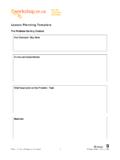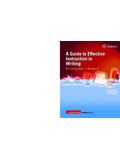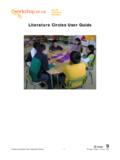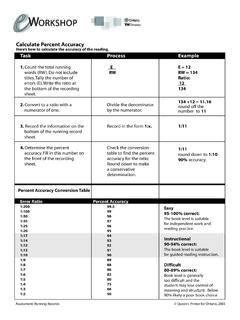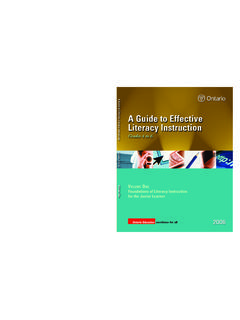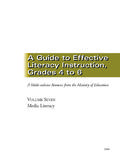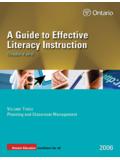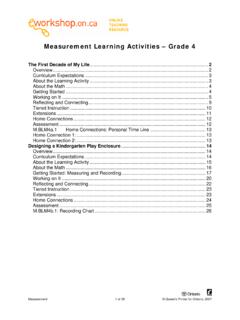Transcription of Independent Reading Assessment Tools
1 Independent Reading Assessment Tools User's Guide Table of Contents _____. INTRODUCTION ..3. ANECDOTAL RECORDS ..4. Sample Record (Daily Reading Observation Record Sheet) ..5. Reading Sample Strategies ..6. Scheduling Reading Conferences ..7. Implementing Reading Examples of Reading Conferences ..8. ORAL How to Use Oral Guidelines for Assessing a Student's Comprehension ..12. Sample Oral Retell Structures ..13. Reading RESPONSE Personal and Literary Response Journals ..14. Starting a Sample Rubric ..16. Sample Response Journals ..17. WRITTEN RESPONSES AND VISUAL How to Use Written Responses ..20. Visual Organizers ..21. Example for Character Example of Venn Diagram ..21. Examples for Text Study Fiction ..23. Examples for Text Study Factual Texts ..26. Reading LOGS ..30. How to Use Reading Logs ..30. Sample Reading Logs ..30. PORTFOLIOS ..32. 2. Independent Reading Assessment Tools User's Guide Queen's Printer for Ontario, 2005.
2 Introduction _____. Assessment is the key to good teaching. In Kindergarten to Grade 3, it involves the systematic gathering of information on students' Reading behaviours, knowledge, and skills to compile solid data on which to base the evaluation of student's Reading abilities. The following diagram outlines the range of Assessment Tools and strategies that relate specifically to Independent Reading : Assessment Tools for Independent Reading Before Reading anecdotal record During Reading Reading conference oral retell Reading response journal After Reading written response Reading log portfolio Note that most of these Tools can be used at each stage of the Reading process, depending on the type of Assessment that is being carried out. 3. Independent Reading Assessment Tools User's Guide Queen's Printer for Ontario, 2005. Anecdotal Records _____. It is impossible to remember specific details about each student's Reading on a daily basis.
3 To be sure that your information is accurate, you should take notes, whenever possible, during the time spent with your students. These notes should be shared and discussed with your students to help them develop a clear understanding of their patterns of learning and growth. Anecdotal notes may be made on observed behaviours such as: comprehension reasons for self-selection of Independent Reading materials ability to retell ability to summarize areas of interest For an example of an anecdotal record, see the Daily Reading Observation Record Sheet on page 5. 4. Independent Reading Assessment Tools User's Guide Queen's Printer for Ontario, 2005. Daily Reading Observation Record Sheet Date:_____. Instructional Approach: Guided Shared Independent Title of Book: Group: Lesson Focus: Names .. Next time: Instructional Approach: Guided Shared Independent Title of Book: Group: Lesson Focus.
4 Name .. Next time: 5. Independent Reading Assessment Tools User's Guide Queen's Printer for Ontario, 2005. Reading Conferences _____. Reading conferences can be used for both Assessment and instruction. The conferences should be kept brief and focused. The teacher can select two to three students with whom to hold a Reading conference each day. emergent and early readers will need help with word-level as well as text-level skills, and must be taught how to self-monitor and self-correct their Reading . The focus for fluent readers will likely be based more on comprehension, particularly when new genres or topics are introduced. Sample Strategies You might wish to review these Reading strategies when conferencing with your students: Be sure to read right to the end of each word. Make sure you understand both the words and the meaning of the text. To get a better sense of the meaning, chunk words while you read, rather than Reading word by word.
5 Reread the sentence when you do not understand what is being said. When you have difficulty Reading a word, try various ways to problem-solve it: sound it out;. think about another word you know that looks like this word; read to the end of the sentence, then go back to read the difficult word. When you don't know what a word means, write it down on a sticky note. If you still don't know what it means when you have read the paragraph or page, check with your Reading partner or look for the definition in the dictionary. At the end of a paragraph, stop and ask yourself if you have understood what you just read. As you read, make pictures in your mind about what is happening. As you read the story, think about why the characters act as they do. Think about what these actions tell you about the characters? Practise making connections between the story and your life or between the story and other books you have read.
6 Have you read other books on the same topic? Have you ever had events in the story happen to you? Read different genres. For instance, this month, look for books that are non-fiction and poetry. Read ___ minutes each day at school and ___ minutes each day at home. 6. Independent Reading Assessment Tools User's Guide Queen's Printer for Ontario, 2005. Scheduling Reading Conferences Begin to hold informal Reading conferences with students from the very first week of the school year. Hold conferences each day, at first, so that you can learn about your students'. individual strengths and needs. This initial gathering of data will allow you to: plan instruction to meet individual needs;. ensure that each student will receive appropriate Reading support (and additional support if necessary);. ensure that students select books that are "just right" for their Independent Reading .
7 Choose appropriate books for individual student book bins;. ensure that Reading partners are well matched;. help students select appropriate Reading goals;. gather sufficient information to launch a home Reading program and make suggestions for parents who wish to help their children read at home. Having gathered initial, baseline data, you will now be monitoring individual Reading patterns and providing individual mini-lessons to meet specific needs for the remainder of the year. Implementing Reading Conferences The Reading conference may be initiated by you or by a student. The best practice is for you to identify, at the beginning of the lesson, the students who will participate in conferences that day. You should then ask if any other students who would like to request a conference. Guidelines for student-initiated conferences should be established at the start of the year.
8 After students become comfortable with talking about their Reading , they tend to enjoy having the opportunity to meet individually with the teacher, and may request a conference more often than required. Students should know that they can request a conference only under specific circumstances; for instance: when the student wishes to change the books in his or her book bin. If the books have become too easy, it is time to update the collection. Ask the student to select books to retain for further Reading and practice, and books to exchange. when the student wishes the teacher to check on his or her use of Reading strategies. During a previous teacher-initiated conference, the student may have been asked to practise the use of a specific Reading strategy ( , chunking words rather than Reading word by word). After this strategy has been practised for a period of time, the student may ask the teacher to assess the progress made.
9 When the student wants help in selecting a broader range of genres. The student may want to select more factual texts, but needs help in choosing topics in which he or she has sufficient background knowledge to be able to read the texts independently. 7. Independent Reading Assessment Tools User's Guide Queen's Printer for Ontario, 2005. Examples of Reading Conferences Reading conferences may be used in combination with other Assessment Tools or may be conducted independently or with small groups. Choose a Reading conference structure that works best for you and your students. Examples of Reading conference structures are: an Assessment Reading conference a Reading conference combined with the administration of a running record a conference that includes routine sample questions a conference with Reading partners Example 1 An informal Reading conference*. 1. Begin by setting a purpose, which will help the student understand the importance of the conference.
10 2. Look at and discuss Assessment information with the student (student Reading portfolio, interest/attitude survey, teacher observations, etc.). 3. Ask questions (teacher or student). 4. Together with the student, set an Independent Reading goal ( , application of a Reading strategy such as rereading to clarify meaning). Teach a mini-lesson. Steps: explain the strategy;. model the strategy for the student;. ask the student to practise the strategy a few times to verify understanding;. ask the student to write down the goal in his or her Reading log, notebook, or agenda. *Make anecdotal records during the conference. Example 2 A Reading conference that includes a running record*. 1. Introduce a text to the student. 2. Ask the student to read the text independently. You may also request a written response based on your directions. 3. Later, call the student to the conference area to read aloud while you administer a running record.
